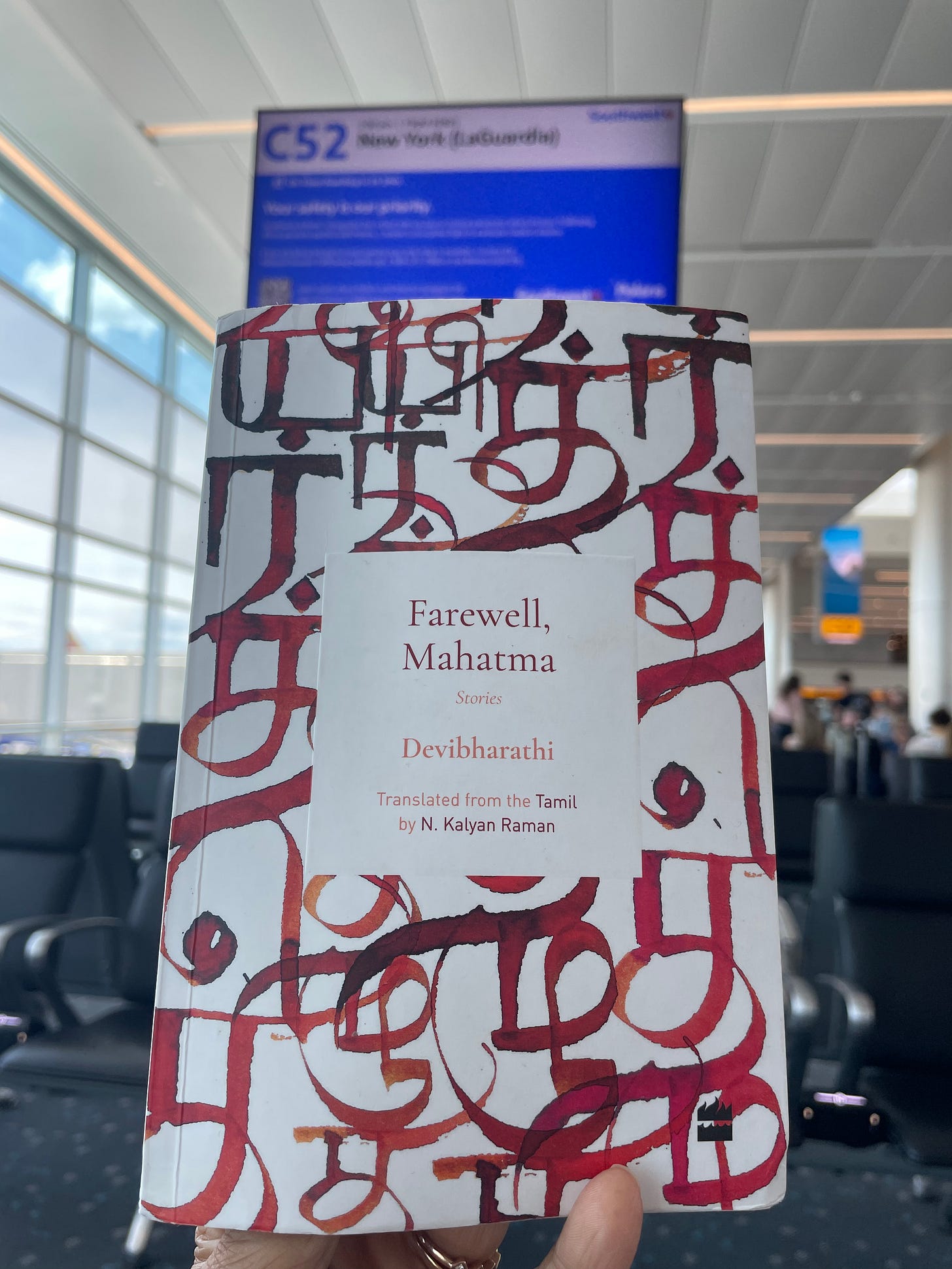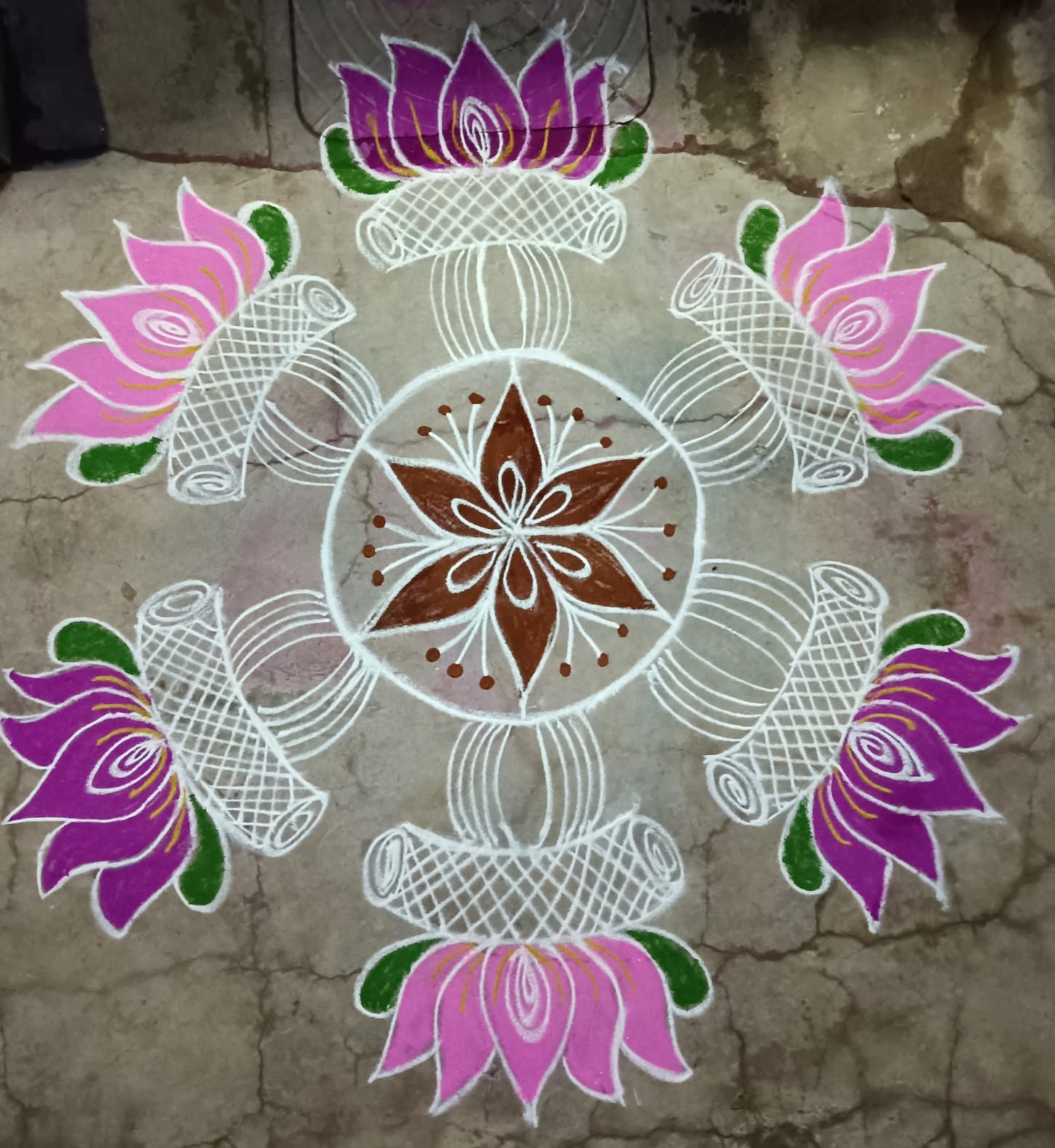TAMIL SHORT STORIES
This collection of gritty Tamil stories put a spell on me on my flight from San Francisco to New York.

I’ve now read several Tamil writers in translation, and the more I read, the more I’m excited about whom (and what) I’ll discover in my mother tongue. This collection of tales from the hinterlands of Tamil Nadu—Farewell, Mahatma, by Devibharathi—closes with an interview of the author by the translator N. Kalyan Raman. What I always find invaluable is the translator’s note; in this one I learned about the peculiarities of the diglossic language that I call my native tongue.
“In Tamil, a famously diglossic language, both diction and speech rhythms varied with region, class and, most importantly, with caste. This led to an informal ‘enclave’ mentality among the early practitioners, most of them hailing from the upper castes. The space of modernist literature, as with the province of classical texts, remained inaccessible to large sections of Tamil society.
It was only after the passage of fifty years, during which Tamil society was subject to transformative changes, that narrative fiction in Tamil began to employ a contemporary prose style that was accessible by all Tamil-speaking people.”
~ N. Kalyan Raman, Translator’s Note
Save for a couple of stories in this collection, this is not a book one carries in the bag on a holiday by the beach. These stories are gritty and disturbing. I think they were actually perfect for Saturday’s long airplane ride across the United States during which I wanted to forget about the inconveniences of air travel on a budget airline. Some stories I found so visceral and revolting that I had to stop reading; yet they were so brilliant in concept and so darkly comic, I know I will be rereading them just to capture the important moments I may have missed on a first iteration.
This is one collection I’ll be happy to leave behind for my children when I leave New York. I was a little concerned that my sleep was going to be disturbed by a story called Reversal in which an adulterous woman and her lover Arun have just killed her husband Viswam but I woke up after a dreamless night.
Making a mental note of the time, she went to the kitchen to make tea for Arun and herself. After tea they went to the bathroom to wash their blood-spattered bodies. To them, it had only seemed like one of their usual moments. It required no effort on their part to forget, if only for the time being, everything that had happened earlier that evening. Neither Arun’s sense of humor nor her playfulness was affected even slightly. Nor did they hesitate to exchange words dripping with love and desire.
As Sasi keeps vigil by her husband’s congealing corpse, we realize that time is a character, too, playing havoc with her mind. All the gadgets that keep time have been jettisoned in the fights between the husband and wife. Neither is the grandfather clock in the house in control of its time for reasons unknown to us. By the time this brilliant story ends, nothing is guaranteed and she knows, as surely as Viswam’s body putrefies, that she cannot ever return to a safe point in her past. What I found riveting about this story is the scene-setting, and the “rewinding” and “forwarding” of moments and situations from the few hours in the apartment. It hardly came as a surprise when I learned in the interview at the end of the story that Devibharathi was involved in theater for a time.
Throughout these stories, we realize that Devibharathi is also a master of the use of smell to reinforce the poignancy of a story. Almost every tale in this book conjures the effect of odor, both bad and good, on the mental state of the protagonist. The result is (mostly) extreme revulsion or awe on the part of the reader.
Every story in the collection is marked by a raw emotion that colors the actions of the character in the tale and portends the end. In a moving story titled Remains, a young man learns how a gentleman called “Subramaniam sir” is torn by regret when the young man’s father dies unexpectedly in the village. In the end, we realize that the tragedy of a relationship is what remains forever unresolved between two friends. Another unforgettable story is about a tailor who loves his instrument even more than his wife. His passion for the sewing machine clouds his judgement and his lack of pragmatism shows him taking to drink in a fast-changing India.
Of all the stories, the one that ended up with a million LOLS in the marginalia was the eponymous short story of the collection. It’s Devibharathi’s artistic exploration of the last hours of Mahatma Gandhi’s life just before the statesman’s assassination in New Delhi on January 30, 1948, five months after India’s independence from the British crown.
While it’s filled with hilarious situations and observations, Farewell, Mahatma is heartbreaking at many levels. Mahatma Gandhi realizes that he has arrived at a moment in his life when all his principles and his beliefs seem to have been in vain. By being who he is, it seems that he, Gandhi, too, has betrayed India. The Hindus and Muslims of India haven’t understood his efforts at forging a peaceful settlement between them.
While they’re now angry at him for India’s partition and are baying for his blood, there is a “clutch of Mahatmas” disguised as Mahatma Gandhi and making money off of his name. As Gandhi walks towards the railway station in the hope that he, like Leo Tolstoy, will meet his final moments in the waiting room of the railway station, Gandhi runs into his copies of himself all over the town, and also inside the railway carriage. The dramatic irony of this terrific story is that it’s reflective of contemporary India which generously evokes Gandhi’s name and spirit to justify all sorts of decisions.
“Sir there’s no easier way to ensure your win! Shave off your head. Wrap a piece of khaddar around your shoulders and waist. Hold a brand new copy of the Bhagavad Gita in your hand. Then step on to the street and keep walking. Like him, you must also walk at a brisk pace.”
“The more Gandhi heard, the more surprised he was. The man seemed to revel in what he was saying. As he was not quite past middle age, he must have made strenuous efforts to appear old.”
The pathos of this story is in the ending of the Mahatma’s life, of course. A man who preached non-violence meets a violent end as he’s riddled by bullets from a Hindu assassin. Truth is stranger than fiction. As in the real story of Mahatma Gandhi’s last hours, the best short stories are often ones in which the reader is left shocked by a twist in the end while demonstrating the inevitability of the finale.
Several tales in Farewell, Mahatma have an unreliable narrator. In one of them, the narrator is the protagonist, but in another, the narrator, or the sutradhar—commonly used in Indian performing arts, particularly in theater and storytelling—interrupts too often and breaks the magic of the story. There were many incandescent moments in each of these pieces but they left me dissatisfied somehow, wishing that there had been a more concerted effort at tying up loose ends.
That having been said, most of these stories were memorable for their concision. I remember a discussion with the translator a few months ago when he was in the Bay Area. Kalyan Raman knew I’d bought this book on my last trip to India. “How come you haven’t read it yet?” he wondered.
After reading Farewell, Mahatma I understand the translator’s impatience at my delay in reading it. I also recall a point he made about how writers must keep themselves from “over-writing.” Devibharathi uses words the way my husband uses water and electricity, with a keen eye on wastage and efficiency.The writing in these tales is so taut that the tension often feels like a sickle’s blade against a newborn birthday balloon.





I love your reviews, Kalpana, they're as exhilarating as the books they describe.
I read this one when it first came out a few years ago. Some of the stories here are so, so good. Also read the The Solitude of a Shadow recently - the same writer-translator duo. Very good.